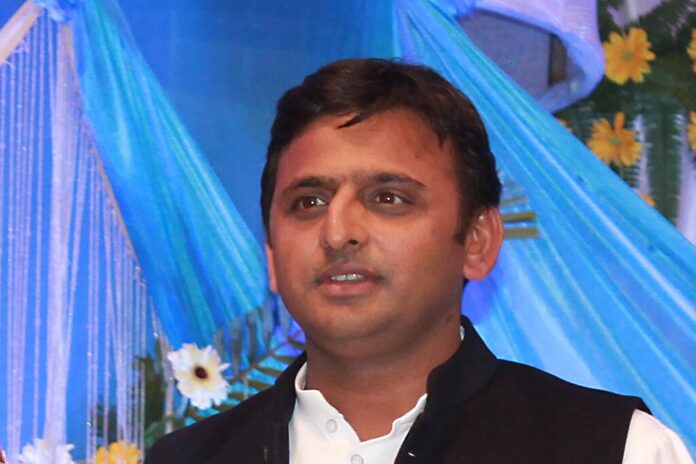Akhilesh Yadav announces alliance candidates for nine assembly seats, focusing on constitutional protection and social justice
As the political landscape in Uttar Pradesh heats up ahead of the forthcoming bypolls, the INDIA bloc, led by Samajwadi Party President Akhilesh Yadav, is poised to contest all nine assembly seats on the party’s iconic cycle symbol. Yadav’s announcement signals a united front among alliance members, including the Congress party, as they aim for a decisive victory in the elections scheduled for November 13.
In a spirited address on Wednesday, Yadav articulated the alliance’s mission, framing the upcoming elections as a crucial battle for the protection of the nation’s Constitution, the preservation of peace, and the honour of the backward classes, Dalits, and minorities. “This is not just an election; it is a movement to uphold the values that bind our society together,” he asserted, highlighting the urgency of their cause.
The former Chief Minister of Uttar Pradesh expressed confidence in the INDIA bloc’s ability to secure victory across all nine seats, emphasising that the alliance’s decision was driven not by mere seat-sharing calculations but by a shared commitment to winning. “We are united, shoulder to shoulder, ready to write a new chapter of victory in this by-election,” Yadav proclaimed, showcasing the coalition’s resolve and optimism.
Embed from Getty ImagesThe nine assembly constituencies in question are Katehari in Ambedkar Nagar, Karhal in Mainpuri, Meerapur in Muzaffarnagar, Ghaziabad, Majhawan in Mirzapur, Sishamau in Kanpur city, Khair in Aligarh, Phulpur in Prayagraj, and Kundarki in Moradabad. Of these, eight seats became vacant after their respective MLAs were elected to the Lok Sabha, while the Sishamau seat requires a bypoll due to the disqualification of SP MLA Irfan Solanki, who faced conviction in a criminal case.
In a statement on social media platform X, Yadav expressed gratitude for the unprecedented cooperation among the INDIA bloc members, describing it as a significant boost for party workers. “Every worker on all nine assembly seats is filled with new energy and resolve to win,” he said, hinting at a surge in grassroots enthusiasm that could play a vital role in the electoral outcome.
Yadav’s rhetoric underscores the critical nature of the elections in Uttar Pradesh, a state that holds significant sway in the overall political narrative of India. The Samajwadi Party’s strategy appears to be one of galvanising not just their traditional voter base but also appealing to broader demographics that include backward classes and minorities, who have historically felt marginalised in the political discourse.
Political analysts suggest that this concerted effort to unify under a single symbol and message could enhance the alliance’s visibility and voter appeal. The emphasis on social justice and constitutional values resonates with many citizens concerned about rising inequality and social discord in recent years. With the current political climate marked by polarisation, the INDIA bloc aims to position itself as a stabilising force, championing inclusivity and collective progress.
As the date of the bypolls approaches, Yadav and his allies will likely ramp up their campaigning efforts, focusing on door-to-door outreach, rallies, and community engagement to solidify their support base. The strategic importance of these elections cannot be overstated; they serve as a litmus test for the INDIA bloc’s ability to coalesce as a formidable opposition to the ruling party and gauge the electorate’s mood ahead of the crucial 2024 general elections.
The Samajwadi Party’s cycle symbol, synonymous with its rich history in Uttar Pradesh politics, will feature prominently in the campaign. The party has long utilised this emblem to foster a sense of identity and connection with voters. Yadav’s leadership will be pivotal in energising the campaign, as he seeks to remind constituents of the Samajwadi Party’s legacy in championing progressive policies and social justice initiatives.
As the elections loom, various factors will come into play, including local issues, candidate popularity, and the overarching national sentiment towards the ruling party. Yadav’s emphasis on constitutional values and social equity aims to resonate deeply with voters who feel disenfranchised or disconnected from mainstream politics.
In conclusion, the INDIA bloc’s strategic approach to the Uttar Pradesh bypolls represents not just a quest for electoral success but also a broader campaign for social justice and constitutional integrity. With Akhilesh Yadav at the helm, the coalition is gearing up to make its mark, advocating for the rights of backward classes, Dalits, and minorities while striving to solidify its standing ahead of the larger electoral battles to come.
